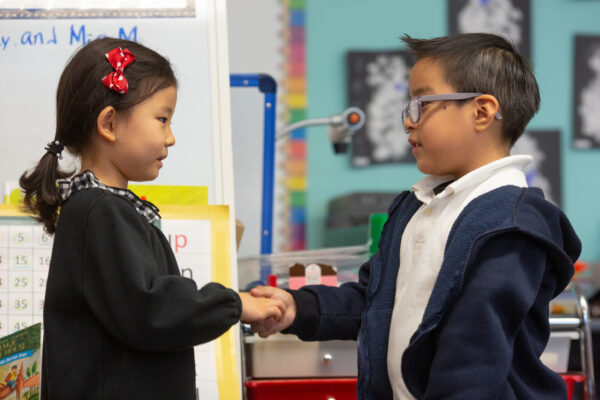Early in the summer of 2020, we ran into one of our then 3-year-old daughter’s classmates while on a walk. She hadn’t seen him since the beginning of the pandemic four months earlier. A late afternoon rain shower had just let up, and the five minutesthey spent holding hands, jumping, stomping, and splashing through the muddy puddles were pure bliss.
This fleeting interaction perfectly captured what we all intuitively know and what new data about the impact of the pandemic confirms: kids need kids. According to a growing body of research, one of the critical inputs fueling the historic levels of learning loss—illuminated by the recent release of 2022 National Assessment of Educational Progress scores and a proliferating youth mental health crisis—is the physical and emotional disconnection from friends and peers that many children and adolescents experienced during the pandemic.
Friendships matter. Strong relationships that begin early in life fuel social and emotional development and wellness. Children with friends are generally healthier, have higher self-esteem, and are better at managing stress. Psychological well-being, in turn, is associated with better academic outcomes. Friendships also help children build essential life skills that carry over into their adult lives and are critical to success in the workplace, skills that inform how we manage ourselves, think, interact and lead.
Young people themselves are verifying the critical nature of their friendships. In a recent national poll of high schoolers, 70 percent of students reported being somewhat or very concerned about their relationships and social life. In the same survey, students said the group that best understood them and their needs as high school students are their friends.
While the challenges of providing high-quality virtual instruction are well known, an evolving body of research makes clear that virtual connection is no substitute for physical proximity among young people. Researchers recently found that increased time on social media and a reliance on virtual relationships increased depression in adolescents.
Compounding these consequences of the physical dislocation caused by the pandemic is the reality that we’re barreling toward a future with the potential of even less physical interaction, where children and adolescents are inundated with pressure to engage in virtual and augmented worlds.
How can we begin to reverse the troubling decline in close friendships among children and adolescents?
Dr. Meghan Walls, a child psychologist and director of external affairs at Nemours Children’s Hospital in Delaware, says that parents can play a role by modeling good social behavior. “The essentials of childhood relationships start at home,” she says. “Every interaction with family, friends, colleagues or neighbors is an opportunity to demonstrate and reinforce important social skills that allow children to form and maintain healthy relationships. Skills to focus on include appropriately initiating conversations, picking up and acting on social cues, and active listening.”
Schools can systematically foster friendships and some are doing so by building in unstructured time during the school day for students to work with each other, providing nurturing spaces for children to discuss friendships, and engaging children in cooperative tasks. But there’s more work to do: School district spending of federal Covid-relief funds on establishing and maintaining supportive relationships pales in comparison to spending on facilities.
[Read More: How Districts are Spending Billions in Federal Covid Aid]
But a focus on friendships built at kitchen tables and backyards, in classrooms and on playgrounds, can help kindle the joy we saw in our daughter on that rainy day early in the pandemic. And perhaps it could help unravel the social and partisan knots that seem to exist in so many of us, or prevent them from developing and ossifying in our children.
Scripture tells us that friendships “refresh the soul and awaken our hearts with joy.” After the last three years, our children deserve nothing less.
Andrew Buher, a FutureEd senior fellow, is founder and managing director of Opportunity Labs, a nonprofit research firm and consultancy, and a lecturer in public and international affairs at Princeton University.

